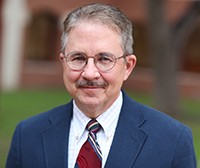By Jeff Brumley
Roger Olson is one of the few voices in American evangelicalism, and among Baptists, who regularly speaks out against the increasingly popular Calvinist movement.
“I guess I do feel a bit lonely,” said Olson, a professor of Christian theology and ethics at Baylor University’s Truett Seminary.
And that isolated feeling doesn’t come just from writing and speaking against something, but also for promoting an alternative theology known as Arminianism.
 If Calvinism is about predestination and assurance of salvation — at least for those lucky enough to be elected by God to receive it — then Arminianism is about God’s grace being available to all.
If Calvinism is about predestination and assurance of salvation — at least for those lucky enough to be elected by God to receive it — then Arminianism is about God’s grace being available to all.
“The emphasis of a truly Arminian church is on God revealed in Jesus Christ and God as good and wanting everyone to be saved,” said Olson, the author of Arminian Theology: Myths and Realities and Against Calvinism, among other books.
“The idea is that God calls people and enables them to respond through the gospel.”
But for the past three or four decades at least, Calvinism has been capturing the hearts and minds of American Christians, especially younger ones. Olson said the credit in part goes to Baptist preacher and writer John Piper for igniting the growing embrace of Reformed theology.
“This new Calvinism centers around … mostly young people who feel like they grew up without any solid theology,” Olson said. “The truth is they did, but it [Arminianism] was more implicit than explicit.”
But Olson is among the few who publically challenge Calvinism’s spread among evangelicals, especially Baptists.
“I know people who agree with me, but for whatever reason, they don’t speak out,” he said.
Olson talked to Baptist News Global about the theological tussle between Calvinism and Arminianism — and his place in that debate.
It seems that Calvinism is really gaining dominance among Baptists. Is it?
I grew up Pentecostal and Calvinism was completely foreign to us. I didn’t learn about about it until college and mostly in seminary — when I went to a Baptist seminary [North American Baptist Seminary]. … There is a whole half of Christianity, including evangelicals, who don’t know about Calvinism. … It’s not new and it’s not that central to everybody.
That other half — do they think of themselves as Arminian?
They’ve always taken it for granted and they are rediscovering their own doctrinal heritage now thanks to the rise of Calvinism.
What is the essential difference between Arminianism and Calvinism?
[Arminianism] is a theology that God is unconditionally good, that God was revealed in Jesus Christ and that God does not want anyone to go to hell. … In Calvinism, God seeks to glorify himself by revealing all his attributes, one of those being justice, and God predestines some people to hell in order to reveal his justice. And he predestines some to heaven to reveal his mercy.
Why is Reformed theology so appealing, especially to some younger Christians?
Psychologically, it seems biblical and logical and answers all their main questions about God and salvation and the purpose of life. It seems to be a very God-exalting theology, as John Piper would put it. For a lot of young Christians who grew up in independent churches or Baptist churches, this is a first encounter with systematic theology….
Theologically, it seems on the surface to be … an alternative to mundane secularity and flaccid, week and limp evangelical Christianity that lacks theological rigor. It seems to be a God-centered theology, and that appeals to a lot of kids who know there must be more to what they have been given.
What is it really?
It’s just a tautology that doesn’t have any meaning at all except that God is God and God does things and they are automatically good because God does them.
Calvinists claim that early Baptist leaders, especially in the American South, were Calvinists. Can Arminians make a comparable claim?
We can make this claim: the very first Baptists were Arminians. We know certainly that John Smyth and Thomas Helwys, among others, were general Baptists and believers in free will. And so were all the Baptists of the first three decades of Baptist history.
I have heard the claim that all of the founders of the Southern Baptist Convention were Calvinists. I don’t know that…. I’ve never been a Southern Baptist, so that doesn’t bother me one way or the other. But I can say Baptists have always been Calvinist or Arminian and most agreed to disagree — until recently.
Have you gotten a lot of opposition in your promotion of Arminianism?
When I emerged out of Pentecostalism and wanted to be part of the larger evangelical conversation … I was told Calvinism was the norm and if you weren’t a Calvinist you should at least pretend to be. So I began to push back against this expectation that if you’re going to be a good evangelical theologian or leader … you need to be Reformed or Calvinist. And I began to feel push back for pushing back.
What’s the major problem against Calvinism, as you see it?
Calvinism, as a system of theology, impugns the reputation of God. … When Jesus weeps over Jerusalem and says “how I would have gathered you to myself, but you would not” — that completely contradicts Calvinism that says we have no free will. Calvinism makes God the author of sin and evil.
What are the practical implications for churches which adopt Arminianism or Calvinism?
Here is where I agree with many Calvinists: the average American church is non-theological. It doesn’t have any particular position. If it does, it’s buried under dust…. So many American churches emphasis what you need to be successful in life. It’s about consumerism and upward mobility. But Arminianism isn’t that.
